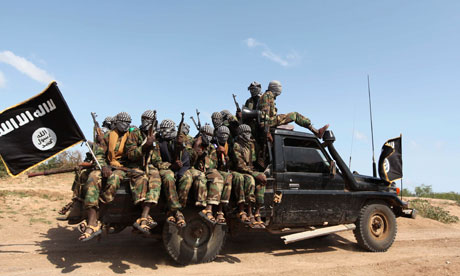Kenya has a right to defend its people and its visitors, but will it be able to deal with the consequences?

Al-Shabaab is just one element in Kenya's and Somalia's shared history of violence. Photograph: Feisal Omar/Reuters
The word "war" is one that Kenyans go to great lengths to avoid invoking. Ethnic clashes, post-election violence, cross-border raids, security operations – these are all things that the average Kenyan is broadly familiar with – but war is something that other countries do. Such an open display of aggression and hostility runs counter to the euphemistic and allegedly peaceful instinct of our national culture. So the news that the Kenyan army was going into Somalia in pursuit of al-Shabaab following the kidnapping and death of Marie Dedieu, our first out-and-out war since independence, has caused surprise and significant concern.
It's not that Kenya and Somalia do not have a shared history of violence. Dedieu's death was, unfortunately, the latest in a long line of hostage-takings that al-Shabaab and other Somali groups have committed in Kenya. Each episode is a harsh indictment of our security forces and their apparent inability to protect our people and our most valuable industry: tourism. The concern is that the belated response from the security forces to these events is more often than not ham-fisted, brutal and generally perpetrated against Kenya's own significant Somali population rather than any member of al-Shabaab or other militia groups. It's hard to rage freely against the crime without some trepidation, as most of us fear the brutal "security operations" that the government implements in north-eastern Kenya, and the news of European and North American involvement in the shadow of Libya only makes it harder to process.
The north-eastern area of Kenya is a tough region, and has been problematic for Nairobi since before independence. It forms part of the "homeland" of "Greater Somalia", which in the colonial era was split between Abyssinian (modern-day Ethiopian), British and Italian spheres of influence. The theoretical agreements between these governments quickly proved practically unenforceable, even though they were enough to disrupt the traditional transhumance of communities in the region.
Absurd borders along fictional geographical lines (of latitude and longitude) were the basis of competing imperial interests in a region that offered very little economic benefit for these powers – the perfect mix for fights about nothing to drag on endlessly. Overall, the three entities spent a great deal of time and money trying to prove that the Somali people living beyond their borders were foreigners, in order to justify excluding them from trans-border grazing areas, while the Somali people tried to sustain their traditional way of life and keep the sense of broader community alive.
These half-hearted attempts at creating some kind of order sowed the seeds for some of the mistrust of governmental action in the region today. The Somali people were never included in the decision-making process and continued to view all three powers with suspicion. Today, considering the rag-tag nature of the al-Shabaab militia, it is unlikely that the Kenyan military will be able to adequately distinguish civilians from combatants, Kenyans from Somalis. No one denies that Kenya has a right to defend its people, but there is some concern for the security of civilians in the region, who continue to bear the brunt of internal brutality and external apathy.
Just before independence, an irredentist movement tried to unite Greater Somalia and the response from Nairobi and Addis was typically violent but ineffective. The governments often supported various clans in their incursions across the new boundaries to try to gain political favour, further blurring the lines between historical, political and economic tensions. At independence, the pattern continued more or less unchecked. The independent government in Kenya promised to support the secession of the north-eastern territory, but quickly reneged on the deal, fuelling the so-called Shifta rebellion, which continued as a low-intensity conflict for the better part of the last five decades.
As it stands, Kenya cannot afford to go to war right now. Aside from internal structural problems and the open question of next year's general election, the struggling dollar has contaminated the economy further as the woes of our biggest trading partners bleed into our own problems. With a bloated government, which was put into power in part to keep the peace and which will continue to grow as constitutional changes create a more federal system, government expenditure has never been higher or, arguably, less productive. All of this comes in the shadow of a slow response to what experts are calling the worst drought in the region in 60 years. (As one Kenyan noted on Twitter, it seems that in Africa they always have money for war but never enough for food.)
Even so, the changing circumstances of al-Shabaab's increasing aggression and apparent lack of central command have led to unspeakable violence against Somali and international civilians, and is a question that demands a robust answer. The troubling issue is whether the Kenyan government, even (or especially?) with French support, is in a position to manage the inevitable fallout.


No comments:
Post a Comment